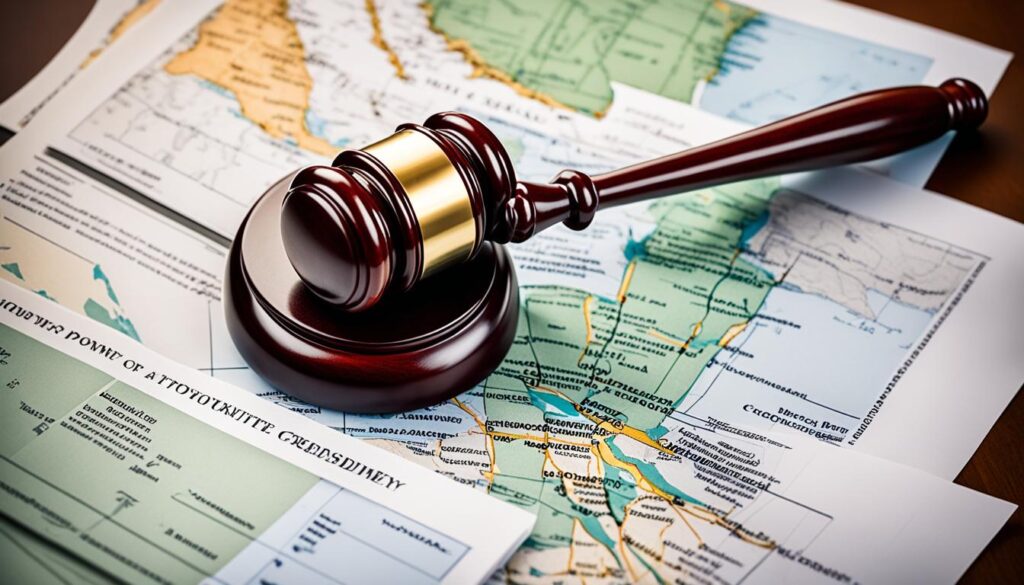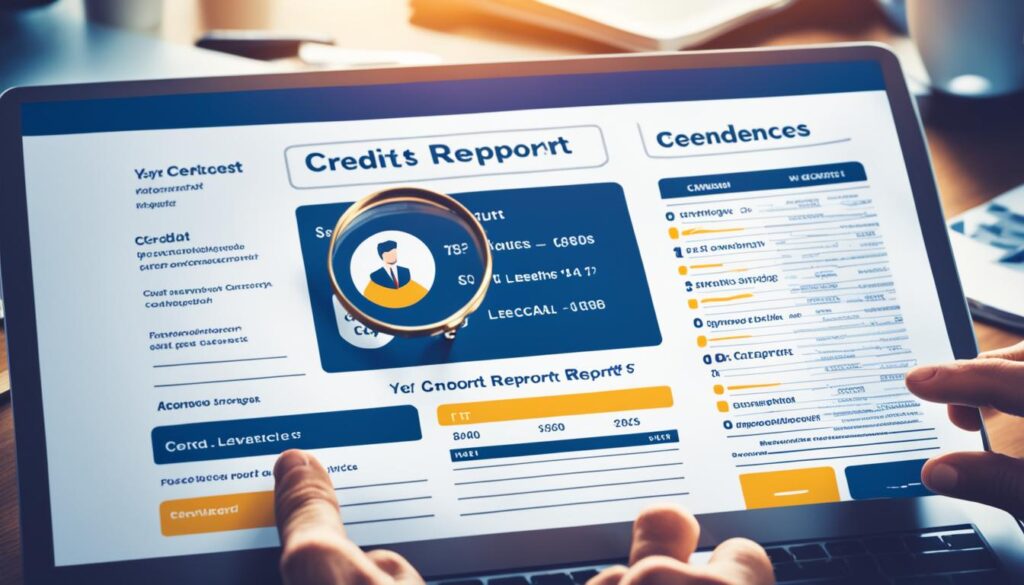Credit report errors can be tough to handle. Improving your credit score requires understanding the credit report dispute process. Many seek an “attorney for credit dispute near me” for expert financial guidance.
Local lawyers know state-specific credit laws well. They understand credit repair details and can help with credit reporting agencies. Their expertise is valuable for complex credit issues.
Nearby attorneys offer face-to-face legal help. This personal approach is crucial for credit disputes. It can make understanding and resolving credit problems much easier.
Key Takeaways
- Local attorneys offer specialized knowledge of state credit laws
- Professional help can streamline the credit dispute process
- Face-to-face meetings provide personalized legal support
- Attorneys can help interpret complex credit report issues
- Legal expertise may lead to faster resolution of disputes
Understanding Credit Disputes and Their Importance
Credit disputes are vital for your financial health. They help fix errors on your credit report. Let’s explore credit disputes and their significance.
What is a credit dispute?
A credit dispute challenges incorrect information on your credit report. This includes wrong account details or fraudulent activity. Disputing credit report errors is your legal right.
Why addressing credit report errors is crucial
Errors on your credit report can harm your financial future. They can lower your credit score and limit opportunities. Fixing these errors quickly protects your financial reputation.
The impact of inaccurate credit information on your financial health
Inaccurate credit information can cause problems. It may lead to higher loan interest rates. It can also result in denied credit applications.
- Higher interest rates on loans
- Denied credit applications
- Difficulty renting an apartment
- Challenges in securing employment
Credit monitoring services help catch errors early. They alert you to changes in your report. This allows you to act quickly if needed.
| Credit Report Errors | Potential Impact | Action Required |
|---|---|---|
| Incorrect personal information | Identity confusion | File dispute with credit bureau |
| Fraudulent accounts | Severe credit score drop | Contact credit bureau and file police report |
| Misreported payment history | Lower credit score | Dispute with credit bureau and creditor |
Knowing about credit disputes helps protect your financial future. Monitor your credit often. Dispute errors promptly when you find them.
The Role of Attorneys in Credit Dispute Resolution
Credit dispute attorneys help people navigate complex credit reporting issues. They’re experts in fair credit reporting laws and effective credit repair strategies. These legal pros offer valuable services to their clients.
Attorneys can review credit reports for errors. They draft dispute letters to credit bureaus. They also negotiate with creditors for their clients.
- Review credit reports for inaccuracies
- Draft dispute letters to credit bureaus
- Negotiate with creditors on behalf of clients
- Represent clients in court if necessary

Attorneys deeply understand the fair credit reporting act. This knowledge protects clients’ rights. It ensures credit bureaus follow legal requirements.
“A skilled credit dispute attorney can significantly improve your chances of successful dispute resolution.”
Lawyers use various tactics to get positive results. These may include debt validation and goodwill interventions. They also use statute of limitations defense.
| Tactic | Description | Potential Benefit |
|---|---|---|
| Debt validation | Requesting proof of debt from creditors | Removal of unverifiable debts |
| Goodwill interventions | Negotiating with creditors for removal of negative items | Improvement in credit score |
| Statute of limitations defense | Identifying time-barred debts | Protection from illegal collection attempts |
Credit dispute attorneys often achieve faster, better results. Their expertise and resources outperform individuals trying to solve issues alone.
How to Remove Dispute from Credit Report
Removing a dispute from your credit report can boost your financial health. The process needs patience and careful attention. Let’s look at the steps and challenges you might face.
Step-by-step Guide to Dispute Removal
To remove a dispute from your credit report, follow these steps:
- Contact the credit bureau in writing
- Provide proof of dispute resolution
- Request removal of the dispute notation
- Follow up regularly
Overcoming Common Challenges
You might face obstacles when removing negative items from your credit report. Here are tips to help you:
- Keep detailed records of all communications
- Be persistent and follow up regularly
- Consider seeking professional help if needed
Timeline for Dispute Removal
The time to remove a dispute can vary. Here’s what to expect:
| Action | Estimated Time |
|---|---|
| Credit bureau response | 30-45 days |
| Dispute removal processing | 1-2 weeks |
| Credit report update | 30-60 days |
Patience is key when removing a dispute from your credit report. Stay focused and keep working at it.
Your efforts will pay off if you remain diligent. Don’t give up, and you’ll see positive results.
Locating a Qualified Credit Dispute Attorney in Your Area
A skilled credit dispute attorney can help resolve credit report issues. Contact your local bar association for referrals. They often have lists of attorneys specializing in credit law.
Online legal directories are useful for finding credit dispute specialists nearby. These platforms allow searching by location and practice area. Many include client reviews to help assess an attorney’s reputation.

Credit counseling agencies can recommend reputable credit dispute attorneys. While they don’t offer legal services, they often work closely with these professionals.
Choose attorneys familiar with local laws and regulations. Local expertise is crucial for navigating state-specific credit laws. It helps build relationships with regional credit bureaus.
“A local attorney who understands the nuances of your state’s credit laws can often achieve faster and more favorable outcomes.”
Schedule consultations with multiple attorneys before deciding. Compare their expertise, fees, and approach to your case. This ensures you find the best fit for your credit dispute needs.
Key Factors to Consider When Choosing a Credit Dispute Lawyer
Picking the right credit dispute lawyer is vital for boosting your credit score. They can help handle credit bureau dispute letters effectively. Consider these key factors to make a smart choice.
Experience and Specialization in Credit Law
Seek attorneys with deep knowledge of credit law. Their expertise helps them tackle complex credit issues. They can create strong strategies for resolving disputes.
Success Rate and Client Testimonials
Check the lawyer’s track record by looking at their success rate. Review client feedback too. Credit specialists with a history of good results are more likely to help you.
“My credit dispute lawyer’s expertise made all the difference. They successfully removed inaccurate items from my credit report, significantly improving my score.”
Fee Structures and Payment Options
Understanding legal service costs is crucial. Compare different fee structures and payment plans. Find a lawyer who fits your budget but still offers quality help.
| Fee Structure | Description | Suitability |
|---|---|---|
| Flat Fee | One-time payment for specific services | Simple credit disputes |
| Hourly Rate | Charged per hour of work | Complex cases requiring extensive research |
| Contingency Fee | Percentage of recovered damages | Cases with potential financial compensation |
Think carefully about these factors when choosing a credit dispute lawyer. The right one can tackle your credit issues effectively. They’ll work hard to improve your financial standing.
The Credit Report Dispute Process: What to Expect
Spotting errors on your credit report? Taking action is vital. The credit report dispute process can be tricky, but it’s key for good finances.

Start by contacting the credit bureaus. Provide proof to back your claim. Credit bureaus have 30 days to look into your dispute.
They’ll check with the info provider. If the provider can’t confirm, the data must be removed. The Fair Credit Reporting Act protects you.
“Regularly reviewing your credit report is essential for catching and disputing errors promptly.”
Here’s a breakdown of what to expect during the dispute process:
| Step | Action | Timeframe |
|---|---|---|
| 1 | File dispute with credit bureau | Day 1 |
| 2 | Bureau investigates claim | Up to 30 days |
| 3 | Receive results of investigation | Day 31-45 |
| 4 | Review updated credit report | Within 90 days |
AI tools can help with disputes. But know your rights under the Fair Credit Reporting Act. This knowledge is crucial for success.
Legal Protections: Understanding the Fair Credit Reporting Act
The Fair Credit Reporting Act (FCRA) protects consumers’ credit information. It sets rules for credit reporting agencies and users. The FCRA is essential for credit repair tactics.
Your Rights Under the FCRA
The FCRA grants you several key rights:
- Access to your credit report
- Right to dispute wrong information
- Right to know if information was used against you
- Right to add a brief statement to your credit report
How Attorneys Use the FCRA to Protect Clients
Lawyers use the FCRA to help clients dispute errors. They can sue for damages if your rights are violated. Attorneys also ensure credit bureaus follow reporting laws.
Penalties for Violating the FCRA
Credit reporting agencies face strict penalties for breaking FCRA rules. These can include:
| Violation Type | Penalty |
|---|---|
| Willful non-compliance | Up to $1,000 per violation |
| Negligent non-compliance | Actual damages |
| Obtaining credit report under false pretenses | Up to $1,000 or actual damages |
Understanding your Fair Credit Reporting Act rights is vital. It helps you manage your credit health effectively. You can seek justice if your rights are violated.
DIY vs. Professional Help: Pros and Cons
Credit disputes offer two paths: DIY or professional help. DIY can save money and boost confidence. Start by checking your credit reports for mistakes.
If you find errors, file disputes with credit bureaus directly. This approach gives you control over your credit repair process.
Credit monitoring services offer expert knowledge and ease. They know credit laws well and can handle tough cases faster.
These pros often have good ties with credit bureaus. This can make the dispute process quicker and smoother.
Credit counseling agencies can guide you if you feel lost. They explain credit reports and suggest ways to boost your score.
They also help with budgeting. While they don’t handle disputes, their advice can improve your credit health.
Your choice depends on your unique case. Simple errors may be easy to fix alone. Complex issues might need expert help.
Consider your time, money, and case complexity. This will help you choose the best path for your credit repair.

